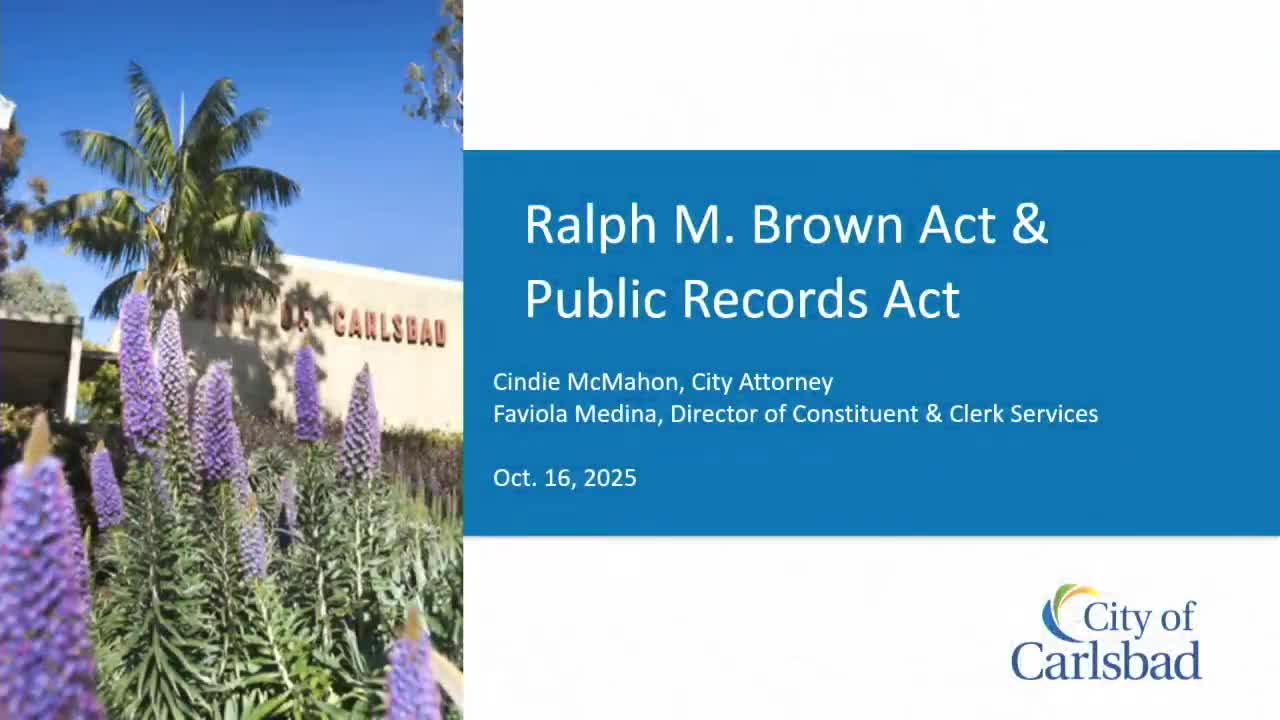City attorney briefs Carlsbad investment review board on Brown Act, Public Records Act and conflict rules
Get AI-powered insights, summaries, and transcripts
Subscribe
Summary
City Attorney Cindy McMahon and Director Faviola Medina reviewed open‑meeting and anti‑corruption rules, including the Brown Act, the California Public Records Act, recusal procedures under the Political Reform Act, and Government Code section 1090.
City Attorney Cindy McMahon and Director of Constituent and Clerk Services Faviola Medina told the City of Carlsbad Investment Review Board that California law requires public and transparent board governance, and outlined common conflict‑of‑interest and public‑records obligations for board members.
McMahon said most communications sent to or from board members about city business are city records under the California Public Records Act, including emails and text messages on personal devices, and therefore may be subject to public disclosure. She briefed the board on the Brown Act’s broad definition of a “meeting,” which includes any communication among a majority of members about matters within the board’s purview and can occur serially through separate conversations or on social media.
McMahon described the Political Reform Act’s conflict rules, noting typical thresholds tied to Form 700 disclosures: business or real‑property investments at $200,000, sources of income of $2,000 or more in the prior 12 months, and gifts of $630 or more (all figures noted during the presentation). She told members that if they determine they have a disqualifying financial interest they must recuse: announce the disqualification on the record, state the basis, leave the dais and wait outside the room until the item is concluded. McMahon also summarized common‑law conflicts and Government Code section 1090 (anti‑self‑dealing), and pointed the board to the Fair Political Practices Commission for advice and written opinions (which may require about 30 days).
Medina reviewed meeting procedures the board will follow: regular meetings must be noticed at least 72 hours in advance (special meetings at least 24 hours), agendas guide the public discussion and items not on the agenda generally cannot be debated at the meeting beyond arranging to place them on a future agenda, and consent calendar items are voted on as a slate unless pulled for discussion. She described public comment rules, correspondence handling, the city’s Laserfiche document repository and records request portal, and said staff will blind‑copy members when sharing constituent correspondence so as not to create a serial meeting.
Both McMahon and Medina repeatedly advised board members to route external correspondence and potential conflicts through the staff liaison or city clerk so staff can manage records and, when necessary, seek legal advice. They emphasized that these are high‑risk areas for inadvertent Brown Act violations and public records obligations and that staff is available to assist with assessments of potential conflicts.
The presentation concluded with time for board questions; one member asked whether prior ownership of municipal bonds would automatically create a conflict, and McMahon replied that determining a disqualifying interest requires a four‑step analysis and that members should consult the staff liaison for case‑specific review.
